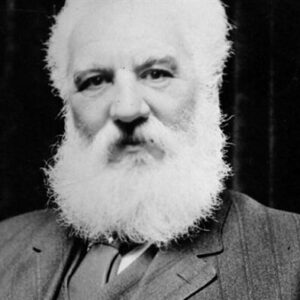Alexander Graham Bell, one of the greatest inventors of the late nineteenth century, is most known for inventing the telephone and founding the ‘Bell Telephone Company’ shortly after. With his fullest dedication and earnest efforts, he sought to support the progress of scientific knowledge throughout his life. After his family relocated from London, England to Ontario, Canada in an attempt to better his health, he began his career in earnest. He began his career as an elocution teacher for the deaf, where he relentlessly fought to popularize an early form of sign language across the United States. He demonstrated his inventiveness by inventing a variety of sound recording and transmission technologies. His research interests evolved away from transmission systems and toward transportation in his latter years, encompassing both aeronautics and experimental kinds of boats that would later become known as hydrofoils. His greatest accomplishment is the creation of the telephone, which revolutionized and continues to revolutionize the way people communicate throughout the world. He was a trailblazer who gave mankind one of the most amazing and ground-breaking inventions in human history: the telephone.
Childhood and Adolescence
Prof. Alexander Melville Bell and his wife Eliza Grace Symonds had him on March 3, 1847, in Edinburgh, Scotland. Melville James Bell and Edward Charles Bell, his two brothers, both died of tuberculosis.
His father was a deaf elocutionist who created the ‘Visible Speech’ system to assist deaf youngsters in learning to talk. Despite her deafness, his mother was an exceptionally skilled painter and musician, and he acquired the most of his early schooling from her.
He attended standard educational institutions throughout his upbringing, including Edinburgh’s Royal High School, which he left at the age of 15.
He first studied at the University of Edinburgh and subsequently at University College in London, England, although he did not get a formal education similar to that of his Victorian classmates.
After the deaths of two of his brothers in 1870, the Bell family relocated to Canada for his health. He began working on transmitting telephonic signals, building on his father’s work of teaching deaf people to converse. He started the ‘School of Vocal Physiology and Mechanics of Speech’ in Boston in 1872, where he taught elocution to his students. In 1873, he was appointed to the Boston University School of Oratory as a professor of ‘Vocal Physiology and Elocution.’
While pursuing his teaching career, he worked on perfecting the harmonic telegraph, which allowed him to send many telegraph messages over a single line. In addition, he was captivated to another concept of sending human speech across wires.
In 1874, he employed Thomas Watson, a talented electrician, as an assistant who devised the equipment and instruments he need to complete the job. They built a terrific cooperation over the years and worked on both ideas, the harmonic telegraph and a voice transmission device.
On March 10, 1876, he made the first comprehensible telephone call when he summoned his assistant with the words “Mr. Watson—come here—I want to see you,” which Bell copied in his lab notes. Watson received the first phone call after hearing his voice through the wire.
After a legal struggle with inventor Elisha Gray, who claimed his telephone invention preceded Bell’s, the United States Supreme Court ruled in Bell’s favor, and the ‘Bell Telephone Company’ was founded in 1877.
He invented the Graphophone and other early sound recording equipment by 1883, including a magnetic recording technology that was an early type of tape recording.
His focus shifted away from sound transmission and recording toward transportation technology toward the end of the nineteenth century. He became interested in aviation and helped found the Aerial Experiment Association in 1907.
He also worked on boating technologies from 1906 to 1919, which led to the development of the hydrofoil craft.
Major Projects of Alexander Graham Bell
He is best known for his pioneering work on the telephone’s development. He collaborated on the design and invention of the first working telephone with his helper, Thomas Watson.
His later life was highlighted by numerous inventions, including the improvement of the phonograph. Other notable achievements were in the fields of hydrofoils and aeronautics. He had 18 patents under his own name and another 12 that he shared with partners.
In 1888, he was one of the founding members of the National Geographic Society, and from 1896 to 1904, he served as its president.
Achievements & Awards
The Académiefrançaise, which represented the French government, awarded Bell the Volta Prize for the invention of the telephone in 1880, with a purse of 50,000 francs.
In 1881, the French government awarded him the Légion d’honneur (Legion of Honor).
For his invention of the telephone, he was given the Albert Medal by the Society of Arts of London, England, in 1902.
The Elliott Cresson Medal in Engineering was granted to him by The Franklin Institute in 1912 for “Electrical Transmission of Articulate Speech.”
In 1914, the AIEE awarded him the Edison Medal for “meritorious achievement in the invention of the telephone.”
He also holds at least a dozen honorary degrees from various academic institutions, including eight honorary LL.D.s, two honorary PhDs, a D.Sc., and an M.D.
Personal History and Legacy
In 1877, he married Mabel Hubbard, a ten-year-younger deaf student. After contracting scarlet fever at the age of five, she went deaf.
Elsie May Bell and Marian Hubbard Bell, their two daughters, were among their four offspring. Both of their sons, Edward and Robert, perished in childhood.
He died of diabetes complications on August 2, 1922 at his own estate, Beinn Bhreagh, Nova Scotia, Canada. Every phone on the continent of North America was quiet for one minute during his funeral.


